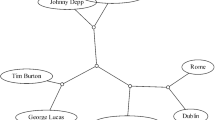Abstract
This paper proposes a GRASP (Greedy Randomized Adaptive Search Procedure) algorithm for the multi-criteria minimum spanning tree problem, which is NP-hard. In this problem a vector of costs is defined for each edge of the graph and the problem is to find all Pareto optimal or efficient spanning trees (solutions). The algorithm is based on the optimization of different weighted utility functions. In each iteration, a weight vector is defined and a solution is built using a greedy randomized constructive procedure. The found solution is submitted to a local search trying to improve the value of the weighted utility function. We use a drop-and-add neighborhood where the spanning trees are represented by Prufer numbers. In order to find a variety of efficient solutions, we use different weight vectors, which are distributed uniformly on the Pareto frontier.
The proposed algorithm is tested on problems with r=2 and 3 criteria. For non-complete graphs with n=10, 20 and 30 nodes, the performance of the algorithm is tested against a complete enumeration. For complete graphs with n=20, 30 and 50 nodes the performance of the algorithm is tested using two types of weighted utility functions. The algorithm is also compared with the multi-criteria version of the Kruskal’s algorithm, which generates supported efficient solutions.
Similar content being viewed by others
References
Arroyo, J. E. C., & Armentano, V. A. (2004). A partial enumeration heuristic for multi-objective flowshop scheduling problems. Journal of Operations Research Society, 55, 1000–1007.
Coello, C. A. C. (2000). An updated survey of GA-based multiobjective optimization techniques. ACM Computing Surveys, 32(2), 109–143.
Cormen, T. H., Leiserson, C. E., Rivest, R. L., & Stein, C. (2001). Introduction to algorithms (2nd ed.). McGraw-Hill: MIT Press.
Deb, K., Agrawal, S., Pratab, A., & Meyarivan, T. (2000). A fast elitist non-dominated sorting genetic algorithm for multi-objective optimization: NSGA-II (KanGAL Report 200001). Indian Institute of Technology, Kanpur, India.
Ehrgott, M., & Gandibleux, X. (2000). A survey and annotated bibliography of multiobjective combinatorial optimization. OR Spektrum 22, 425–460.
Ehrgott, M., & Klamroth, K. (1997). Connectedness of efficient solutions in multiple criteria combinatorial optimization. European Journal of Operational Research, 97, 159–166.
Feo, T. A., & Resende, M. G. C. (1995). Greedy randomized adaptive search procedures. Global Optimization 6, 109–133.
Festa, P., & Resende, M. G. C. (2004). An annotated bibliography of GRASP (Technical Report). Submitted for the European Journal of Operational Research.
Glover, F. (1996). Tabu search and adaptive memory programming: Advances, applications and challenges. In: R. S. Barr, R. V. Helgason, & J. L. Kennington (Eds.), Interfaces in computer science and operations research (pp. 1–75). Kluwer Academic.
Hamacher, H. W., & Ruhe, G. (1994). On spanning tree problems with multiple objectives. Annals of Operations Research, 52, 209–230.
Jones, D. F., Mirrazavi, S. K., & Tamiz, M. (2002). Multi-objective metaheuristics: An overview of the current state-of-art. European Journal of Operational Research, 137, 1–19.
Kirkpatrick, S., Gellat Jr., C. D., & Vecchi, M. P. (1983). Optimization by simulated annealing. Science, 220, 671–680.
Knowles, J. D. (2002). Local search and hybrid evolutionary algorithms for Pareto optimization. Thesis of Doctorate, University of Reading, UK.
Kruskal, J. B. (1956). On the shortest spanning tree of graph and the traveling salesman problem. Proceedings of the American Mathematical Society, 7, 48–50.
Michalewicz, Z. (1996). Genetic algorithm + data structures = evolution programs. Berlin: Springer.
Moon, J. W. (1967). Various proofs of Cayleys formula for counting trees. In Harary, F. (ed.), A seminar on graph theory (pp. 70–78). New York: Holt, Rinehart and Winston.
Murata, T., Ishibuchi, H., & Gen, M. (2001). Specification of genetic search directions in cellular multi-objective genetic algorithms. In Lecture notes in computer science, Vol. 1993. Evolutionary multi-criterion optimization (pp. 82–95). EMO. Zurich: Springer.
Ramos, R. M., Alonso, S., Sicília, J., & Gonzáles, C. (1998). The problem of the optimal biobjective spanning tree problem. European Journal of Operational Research, 111, 617–628.
Steuer, R. E. (1986). Multiple criteria optimization—theory, computation and application. Wiley
Van Veldhuizen, D. A., & Lamont, G. B. (2000). Multiobjective evolutionary algorithms: Analyzing the state-of art. Evolutionary Computation, 8(2), 125–147.
Zhou, G., & Gen, M. (1999). Genetic algorithm approach on multi-criteria minimum spanning tree problem. European Journal of Operational Research, 114, 141–152.
Author information
Authors and Affiliations
Corresponding author
Additional information
This work was funded by the Municipal Town Hall of Campos dos Goytacazes city. The used computer was acquired with resource of CNPq.
Rights and permissions
About this article
Cite this article
Arroyo, J.E.C., Vieira, P.S. & Vianna, D.S. A GRASP algorithm for the multi-criteria minimum spanning tree problem. Ann Oper Res 159, 125–133 (2008). https://doi.org/10.1007/s10479-007-0263-4
Published:
Issue Date:
DOI: https://doi.org/10.1007/s10479-007-0263-4




